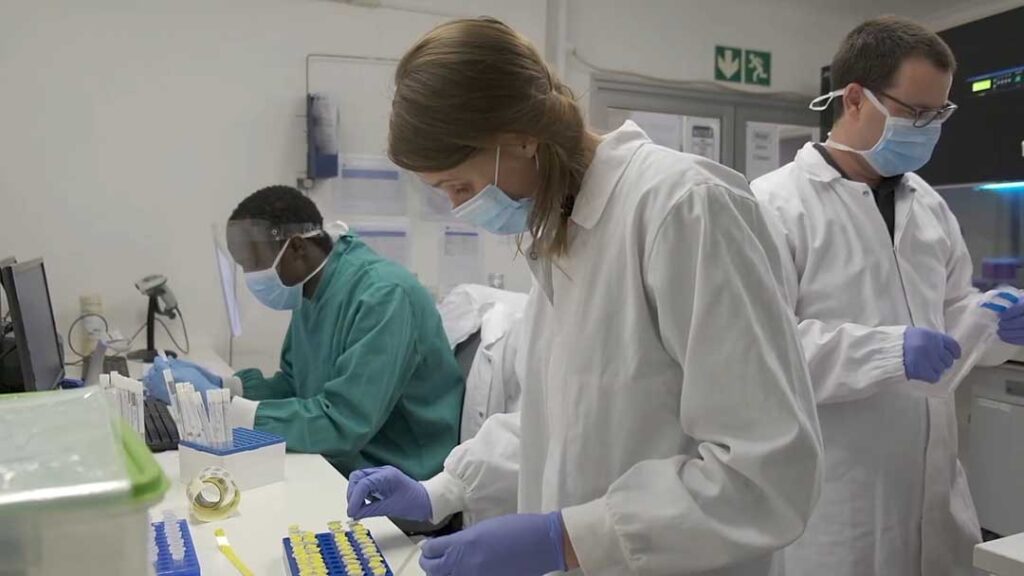ADF STAFF
As the COVID-19 pandemic enters its third year, the next 12 months could be a time of hope but also of uncertainty as African nations continue to wrestle with the demands posed by the disease.
Here are some of the things Africa can expect in year three of COVID-19:
COVID-19 becomes endemic
As the number people with immunity grows, the spread of COVID-19 is likely to slow — but not stop completely. Epidemiologists say this could be the year that COVID-19 shifts from pandemic to endemic, meaning the yearly cases level out and it becomes just another of the world’s list of communicable diseases such as the malaria, the common cold or the flu. Like the flu, COVID-19 could remain a potential killer for years to come, and people with underlying conditions or weakened immune systems will be most at risk.
Economies stay shaky
As the world moves out of the pandemic, the demand for oil is brightening the economic outlook for large exporters such as Angola and Nigeria. But clouds remain on the horizon, Irmgard Erasmus, senior financial economist at Oxford Economic Africa, told ADF.
Some commodities, such as copper, could see prices fall due to oversupply. Foreign economic forces, such as interest rate increases in North America and overheated property markets in Asia, could dampen the prospects for a strong recovery for African nations. Future travel bans like the one imposed after South Africa reported the discovery of the omicron variant could also keep Africa’s economics from flourishing, particularly those that rely on tourism.
“That being said,” Erasmus said, “the more diversified economies, such as Kenya, are comparatively better positioned to weather another potential round of travel bans, partly due to its quick adaptation to the pandemic climate.”
Economic instability is likely to widen the gap between Africa’s more technologically integrated economies and its less advanced economies, she added.
More variants
Despite public health leaders’ repeated calls for people to protect themselves and their loved ones, the African continent recently crossed the 10 million mark for COVID-19 cases.
People with immune systems compromised by HIV/AIDS, tuberculosis of other chronic illnesses create a potential laboratory for new, highly mutated variants to emerge. People with weakened immune systems take longer to fight off an infection, giving the virus more time to change its tactics in the form of new variants. Each variant offers another opportunity for the virus to escape both natural and acquired immunity.
Viruses tend to lessen in virulence as they evolve, but that’s not always the case, according to Dr. Andrew Freedman, an infectious disease expert at Cardiff University Medical School in the United Kingdom.
“It may well be with future variants that they are even more contagious, they may be milder, but we can’t say that with certainty,” Freedman told CNBC.
African-made antivirals
Pharmaceutical companies Merck and Pfizer announced in 2021 that they had developed pill-based antiviral treatments for COVID-19. The treatments are most effective if taken after a test confirms an infection.
In November, Pfizer announced it would allow its antiviral pill to be manufactured in nearly 100 middle- and low-income countries.
South Africa’s Aspen Pharmaceuticals was among the first on the continent to express interest in producing the treatment. Stephen Saad, Aspen’s executive director, said the company plans to apply to produce the pill as a generic medication. However, he was unsure in late 2021 when production might begin.
The Pfizer treatment consists of 30 pills taken over five days. One-third of the pills are ritonavir, a widely produced HIV drug, that will extend the life of the other medication once it’s inside the body.
Fewer lockdowns
The severe nationwide lockdowns that African nations used in 2020 to slow the spread of COVID-19 disrupted daily lives and school schedules and produced widespread economic hardship. They proved less effective at stopping future waves of infection.
As a result, the Africa Centres for Disease Control and Prevention (Africa CDC) will no longer recommend lockdowns to fight COVID-19.
“The period where we are using severe lockdowns as a tool is over,” Africa CDC Director Dr. John Nkengasong said in early January. “We should actually be looking at how we use public health and social measures more carefully and in a balanced way.”

